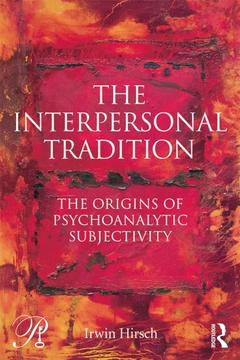The Interpersonal Tradition The origins of psychoanalytic subjectivity Psychoanalysis in a New Key Book Series
Auteur : Hirsch Irwin

In The Interpersonal Tradition: The Origins of Psychoanalytic Subjectivity, Irwin Hirsch offers an overview of psychoanalytic history and in particular the evolution of Interpersonal thinking, which has become central to much contemporary psychoanalytic theory and practice. This book of Hirsch?s selected papers provides an overview of his work on the topic over a thirty year period (1984-2014), with a new introductory chapter and a brief updating prologue to each subsequent chapter.
Hirsch offers an original perspective on clinical psychoanalytic process, comparative psychoanalysis and psychoanalytic theory, particularly explicating the many ways in which Interpersonal thinking is absolutely central to contemporary theory and practice. Each chapter is filled with theoretical explication and clinical examples that illustrate the degree to which the idiosyncratic person of each psychoanalyst inevitably plays a significant role in both analytic praxis and analytic theorizing. Key to this perspective is the recognition that each unique individual analyst is an inherently subjective co-participant in all aspects of analytic process, underscoring the importance that analysts maintain an acute sensitivity to the participation of both parties in the transference-countertransference matrix. Overall, the book argues that the Interpersonal psychoanalytic tradition, more than any other, is responsible for the post-modern and Relational turn in contemporary psychoanalysis.
Based on a range of seminal papers that outline how the Interpersonal psychoanalytic tradition is integral to understanding much of contemporary psychoanalytic thought, this book will be essential reading for practitioners and students of psychoanalysis.
Irwin Hirsch is a practicing psychoanalyst and teacher of psychoanalysis in New York City. He is the author of over 75 journal articles and book chapters and the Goethe Award-winning book, Coasting in the Countertransference: Conflicts of Self-Interest between Analyst and Patient (Routledge, 2008).
Date de parution : 09-2014
15.6x23.4 cm
Disponible chez l'éditeur (délai d'approvisionnement : 14 jours).
Prix indicatif 64,97 €
Ajouter au panierDate de parution : 09-2014
15.6x23.4 cm
Thème de The Interpersonal Tradition :
Mots-clés :
Good Life; NYU Postdoctoral Program; interpersonal; psychoanalytic; subjectivity; origins; Developmental Arrest Model; Sullivan’s Interpersonal Theory; Relational Conflict Model; Transference Countertransference Matrix; Interpersonal Tradition; Contemporary Interpersonal; Contemporary Interpersonal Analysts; Interpersonal Analysts; Blank Screen Model; William Alanson White Institute; Benjamin Wolstein; Erwin Singer; Transference Countertransference Configurations; Countertransference Enactments; Unwitting Participation; Classical Freudian Analysts; Interpersonal Psychoanalysis; Concordant Countertransference; Analyst's Recognition; Long Term Love Relationships; Young Men; Drive Conflict Model; NYU Postdoctoral



